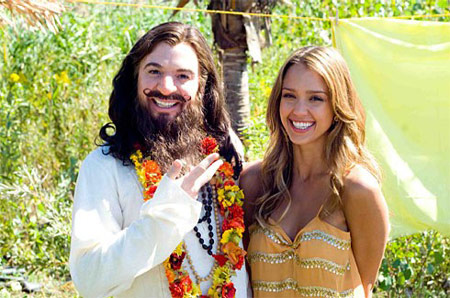Rachel Getting Married
Posted on March 10, 2009 at 8:01 am
Fiction is usually very linear, just because of the limits of time. The longest epic and the thickest novel don’t have enough scope to encompass extraneous detail. In real life people can’t find parking spots and fumble for correct change, but in movies everything usually moves with aerodynamic directness except for the elements of the particular muddle the characters are facing and we are attuned to expect that when a character says he has never done something that by the end of the film he will and that when a character gets a nosebleed by the end of the film he will probably be gone. Movie stories happen in the center of the frame, but real life happens around the edges. Move stories lay things out for the audience but real life is messy. Jonathan Demme’s brilliant new film is messy the way life is messy. Its power sneaks up on you. But by the time it is over, you will find that its characters and story have become real to you in a way that a crisper style of story-telling could not convey.
Kym (Anne Hathaway) is a substance abuser who has been in and out of rehab many times. As the movie opens, she is waiting to be picked up by her father, Paul (Bill Irwin), so she can go to the wedding of her sister Rachel (“Mad Men’s” Rosemarie DeWitt).
Filmed in an intimate, documentary style with a hand-held digital camera, the weekend unfolds like a home movie. The only music we hear is the music of the wedding, as musicians rehearse and perform throughout the weekend. When Paul jokingly tells one of the groom’s cousins, a young serviceman, to stop filming everything all the time it is possible to imagine that what we are watching is the footage he has been taking. Demme takes some audacious risks, letting scenes run on much longer than we are used to. It seems out of control, even self-indulgent until it becomes clear that Demme is utterly in charge and there is not a wasted frame.
Kym is defensive, hypersensitive, contrite, and very needy. She is a master of attention judo. Even in the midst of her sister’s wedding, she manages to turn the subject to herself. At the rehearsal dinner, after loving toast after toast, filled with affectionate jokes, Kym stands up and goes into a long, embarrassing speech about her need to make amends. She has impulsive sex with the best man. She displaces the maid of honor. And nothing is ever enough.
This is not another in the long series of awards-bait movies about substance abusers, going back to “The Lost Weekend” and “Come Fill the Cup,” through “28 Days” and “Clean and Sober.” Although at times it seems she is trying to grab our attention, too, Kym is not the focus of the story though at times she seems to be the manifestation of all of the rest of the family’s repressed feelings, while Paul keeps offering everyone food and pleading with them not to fight and the girls’ mother Abby (Debra Winger in a performance of controlled ferocity), superficially benign but always just out of reach. We see the scars before we hear the stories of the wounds as we meet the second spouses of Paul and Deborah and see how the family talks around certain areas.
But there is enormous generosity of spirit in this family. It is wonderfully diverse, with both Rachel and Paul married to African-Americans and a wide assortment of friends and family. The music that surrounds them is nourishing and inspiring. But there is also enormous pain as we only come to understand so gradually that we feel it before we think it. This masterful film is a quiet treasure, profoundly enriching.


